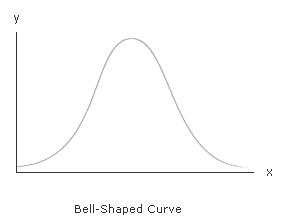 The bell shaped curve, that great equalizer of the school classroom, is meant to explain how a population of test scores will eventually unfold itself neatly along a predetermine path, thus displaying the test results into upper, lower, and average positions. In my eighth grade English class, I prayed that everyone else was as confused and ill-prepared as I, so the entire curve would be adjusted downward, giving me a fighting chance for a graded-on-the-curve C. But the concept of a predictable outcome of highs, mediums and lows, is not just used in school; cars are labeled as luxury, mid class, and economy, you can fly in first class, coach, or in lower fare seats. The bell shaped curve is also used to described our life (yours and mine), in terms of its quality when compared to everyone else. Are we middle class, upper class, or poor? Those labels are thrown at us by politicians, reporters, educators; the need for others to categorize our life into a single box is nearly fanatical in its scope.
The bell shaped curve, that great equalizer of the school classroom, is meant to explain how a population of test scores will eventually unfold itself neatly along a predetermine path, thus displaying the test results into upper, lower, and average positions. In my eighth grade English class, I prayed that everyone else was as confused and ill-prepared as I, so the entire curve would be adjusted downward, giving me a fighting chance for a graded-on-the-curve C. But the concept of a predictable outcome of highs, mediums and lows, is not just used in school; cars are labeled as luxury, mid class, and economy, you can fly in first class, coach, or in lower fare seats. The bell shaped curve is also used to described our life (yours and mine), in terms of its quality when compared to everyone else. Are we middle class, upper class, or poor? Those labels are thrown at us by politicians, reporters, educators; the need for others to categorize our life into a single box is nearly fanatical in its scope.
Perhaps worse is when we place our ability to be happy (content, or joyful) on a human bell shaped curve, relegating the amount of time we can spend being at the apex of life to 10-15 %, and when we are ‘just average’ to 70% of life’s timeline. I don’t believe people knowingly choose a mid-level happiness state for the bulk of their life, I think it just happens. I think we self-impose an expectation that being in a constant state of over-the-top exuberant happiness is wrong – only weird or naive people think like that. We tend to accept that good is good enough, and great is rare.
Ask someone the question, “How are you?” The overwhelming response is, “Good.” You will get a few greats, and a few that are ousy, but good will dominate. I submit that being great is a much more natural state that being good, and that we can, and should, redefine the curve to include more great, and less good and lousy. I believe that the plan was always for greatness, and we have deviated from where we can be.
Here are a few ways to move the bar towards great:
- Redefine the driving force that creates your personal happiness (or joy) away from external sources to internal ones. Try not to rely on a person, place or event to make you happy. Choose to be happy all on your own.
- Use your own definition for happiness, not that of someone else. It’s your life, you get to define it.
- If happiness and joy are elusive, try doing something great for someone else, and something great for yourself too. Feeling great spreads from person to person like butter on warm bread.
I’m not proposing an arrogant version of great or a prideful view of happy. Just the opposite, I am promoting a humble and sincere version of being at the top, where there is room for everyone.
I find joy in my faith, where I am told that I am special, I am one of a kind and I am loved beyond my capacity to comprehend. There is nothing wrong with feeling good, but there is something very right about being great.
Thanks for reading.
 On Good Friday our Lord was crucified, just as He and the Scriptures foretold. We call it Good Friday, because had Jesus not been sacrificed we could not be saved, so it was a good day for us, but being wrongfully accused and killed by jealous men does not usually make for a “good day.” Then on the third day, Easter, Jesus rose from the dead, concurring, Satan, death and sin forever, just as He promised He would do.
On Good Friday our Lord was crucified, just as He and the Scriptures foretold. We call it Good Friday, because had Jesus not been sacrificed we could not be saved, so it was a good day for us, but being wrongfully accused and killed by jealous men does not usually make for a “good day.” Then on the third day, Easter, Jesus rose from the dead, concurring, Satan, death and sin forever, just as He promised He would do.

